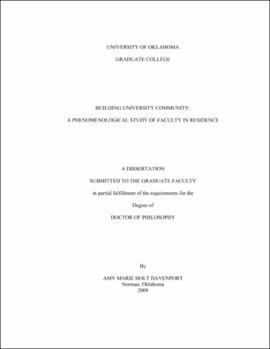| dc.contributor.advisor | Pasque, Penny | |
| dc.creator | Davenport, Amy Marie Holt | |
| dc.date.accessioned | 2019-06-03T20:36:17Z | |
| dc.date.available | 2019-06-03T20:36:17Z | |
| dc.date.issued | 2009 | |
| dc.identifier | 99242446902042 | |
| dc.identifier.uri | https://hdl.handle.net/11244/320242 | |
| dc.description.abstract | In this hermeneutic, phenomenological study, the Faculty In Residence (FIR) program at the University of Oklahoma is explored through the following guiding research questions: | |
| dc.description.abstract | 1.What are the experiences of students and FIRs with the FIR program? | |
| dc.description.abstract | 2.What meaning do students and FIRs ascribe to their experiences? | |
| dc.description.abstract | 3.How do the students and the FIRs perceive student success? | |
| dc.description.abstract | 4.In what, if any, ways do students and FIRs relate the FIR program to student success? | |
| dc.description.abstract | The FIR program melds academic life and home life of both students and faculty members through living together in residence halls. Five themes emerged from interviews with the faculty of the Faculty In Residence program (FIRs): transitions, intangible benefits, relationships, university immersion, and teaching moments. Three themes emerged from student participants including safe haven, mentorship, and activities. | |
| dc.description.abstract | The FIR program is beneficial for students and faculty members involved in the program to promote relationships between students, faculty members, and students and faculty members with all resulting in enhanced university community. In addition, the FIRs transferred their student experiences in the FIR program to their classroom and beyond in the university community. The overall result of the FIR program is a stronger university community that is nurtured through four concepts: building relationships between students and faculty members; exposing faculty members to university operations; providing a bridge between the classroom and life experiences; and establishing an early intervention program. In addition, student success is fostered through the FIR program. | |
| dc.description.abstract | For these reasons, FIR programs are extremely valuable in institutions of higher learning. They promote student-faculty interaction and provide both students and faculty members benefits including those found in this study: the relationships, the gratification of teaching moments, the safe havens for open for debate and experimentation, and activities that provide common bonds between students and faculty members. The FIRs, students, staff, and environment are not mutually exclusive. All are dependent upon each other; all become one as the university community. | |
| dc.format.extent | 274 pages | |
| dc.format.medium | application.pdf | |
| dc.language | en_US | |
| dc.relation.requires | Adobe Acrobat Reader | |
| dc.subject | Resident assistants (Dormitories)--Oklahoma--Norman | |
| dc.subject | Teachers and community--Oklahoma--Norman | |
| dc.title | Building University Community: A Phenomenological Study of Faculty In Residence | |
| dc.type | text | |
| dc.type | document | |
| dc.thesis.degree | Ph.D. | |
| ou.group | Jeannine Rainbolt College of Education::Department of Educational Leadership and Policy Studies | |
